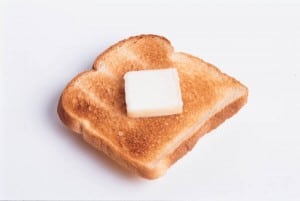 Hold the skim latte and bring on the butter? High-fat breakfasts are enjoying a comeback in some circles, after a study published in the International Journal of Obesity found that rats who ate a high fat breakfast burned more fat throughout the day than rats who ate a high carbohydrate breakfast.
Hold the skim latte and bring on the butter? High-fat breakfasts are enjoying a comeback in some circles, after a study published in the International Journal of Obesity found that rats who ate a high fat breakfast burned more fat throughout the day than rats who ate a high carbohydrate breakfast.
But the reality on the ground looks a little different. Multiple studies have found that people who eat high fat breakfasts end up eating more calories over the course of the day–almost certainly trumping any increase in the fat-burning metabolism observed in the mouse study.
That’s not to say that a breakfast high in refined carbohydrates (corn flakes, toast, jelly, juice, etc.) is the way to go. The ideal breakfast for appetite and weight control appears to be one that’s high in both protein and fiber. So bring on the eggs, tofu, cottage cheese, yogurt, oatmeal and other whole grain cereals.
As a bonus, research suggests that this type of low-glycemic breakfast may help you burn more fat during your lunch-time workout.
____________________________________________
Special Live Event!
Join me tomorrow night, March 8th, at 9pm Eastern for a forum on breakfast, fitness, and weight management. Joining me for this live webcast are Ben Greenfield of BenGreenfieldFitness.com, Darya Pino, PhD of SummerTomato.com, and Gloria Tsang, MS, RD of Healthcastle.com. Your questions and comments are welcome. The event will be broadcast right here on NutritionOverEasy.com. Click here to RSVP.
_________________________________________
The Studies:
Time-of-day-dependent dietary fat consumption influences multiple cardiometabolic syndrome parameters in mice.
Energy and macronutrient composition of breakfast affect gastric emptying of lunch and subsequent food intake, satiety and satiation.
The effects of high-carbohydrate vs high-fat breakfasts on feelings of fullness and alertness, and subsequent food intake
Fat oxidation during exercise and satiety during recovery are increased following a low-glycemic index breakfast in sedentary women.
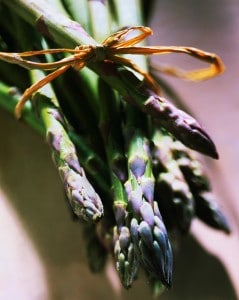 Q. Taught by my grandmother, I practice the time-honored tradition of eating spring greens: dandelions, burdock, stinging nettles, pigweed, lamb’s quarters, plantain, shepherd’s purse, garlic mustard, chickweed, cleavers, and so on. What does modern nutrition have to say about this? Are these greens truly “blood cleansing” or “liver cleansing?
Q. Taught by my grandmother, I practice the time-honored tradition of eating spring greens: dandelions, burdock, stinging nettles, pigweed, lamb’s quarters, plantain, shepherd’s purse, garlic mustard, chickweed, cleavers, and so on. What does modern nutrition have to say about this? Are these greens truly “blood cleansing” or “liver cleansing? 
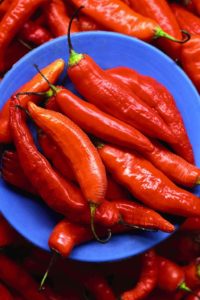 This is the kind of study that the media love: Researchers from Purdue University report that adding a half teaspoon of cayenne pepper to your meal can reduce your appetite and cause you to burn more calories. Count on seeing this new “fat-burning tip” popping up on magazine covers and internet aggregation sites. Before you get too excited, however, it pays to look beyond the headlines.
This is the kind of study that the media love: Researchers from Purdue University report that adding a half teaspoon of cayenne pepper to your meal can reduce your appetite and cause you to burn more calories. Count on seeing this new “fat-burning tip” popping up on magazine covers and internet aggregation sites. Before you get too excited, however, it pays to look beyond the headlines. 
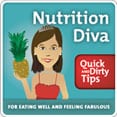
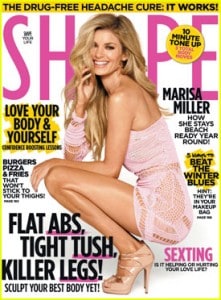
 Hold the skim latte and bring on the butter? High-fat breakfasts are enjoying a comeback in some circles, after
Hold the skim latte and bring on the butter? High-fat breakfasts are enjoying a comeback in some circles, after